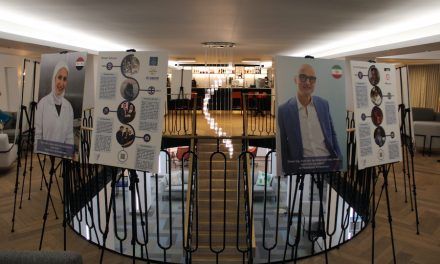Working all hours, lacking sleep, cancelling social engagements and aspiring to unachievable levels of perfection. Many barristers follow these time-honoured work practices that take a heavy toll on their work and home lives. I know. I was one of them, until I found another way…
Beginnings
In summer 2015, a year after taking Silk, I had a meeting with a young barrister in Fleet Street Press near Temple. ‘Let’s see if there’s a table in the basement,’ she suggested in a hushed tone. ‘No one will see us there, and we can speak more freely.’ We found a table in the corner and sat in conspiratorial silence for a few moments. Sensing my hesitancy, she started with a kind smile, ‘Thank you for coming. We need people like you. Tell me your story.’ Two hours later I ascended the stairs, a little lighter, a little more energised and with a strong sense of purpose.
I had just had my first encounter with the co-founder and first chairperson of the Bar Council’s Wellbeing Initiative, the barrister Rachel Spearing. It was to be the first of many. In early 2015 she had written an article in Counsel Magazine summarising the findings of the first Wellbeing at the Bar Assessment, a study sponsored jointly by the Inns and the Bar Council. She ended her piece with a call to action for those with wellbeing stories of their own. Nearly 2,500 barristers had participated in the assessment, and some of the findings of the report had strongly resonated with me at the time:
Perfectionistic pressure… at levels such as reported here are indicative of what is termed as unhealthy perfectionism which, not only leads to diminishing returns on performance, is strongly correlated to psychological ill-health and burnout.
…leadership role models were only sometimes or not at all evident…which in turn is highly correlated to disengagement and reduced performance.
Only a minority reported that they were able to integrate both work and the things of priority to them outside of work or had significant control over their work.
And so I answered her call.
I left our meeting having made a quiet yet firm promise to myself. I promised to find ways of working smarter at the Bar, to support myself and if possible, others. Partly this was born of necessity. I was having genuine thoughts of leaving the profession at the time because of the personal toll my work life had taken on me, but I was not yet ready to throw in the towel. After all, like everyone else in this glorious profession, I had worked hard to achieve my success. I was unwilling to turn my back on it without giving it another chance. But I was also intrigued by one of the clear messages from the wellbeing assessment: that the ingrained work habits our profession unquestioningly assumes are necessary to achieve excellence, are in fact undermining what they are striving to achieve.
I was curious. Two questions took hold of me. Why has the Bar not seen the problem? And, critically, if the Bar is not working in ways best designed to achieve excellence, how can it do things better?
In the years that followed, I applied myself to answering these questions. I trained in individual and organisational coaching, hypnosis, NLP and family therapy, to gain a better understanding of the internal dynamics of people and the groups they belong to. I then started working as a coach and trainer, alongside my Bar practice. I learned practices to integrate my mind and body, such as yoga, meditation and phenomenology, to harness resources beyond mere logic and reason. I became familiar working with perspectives that are most un-barrister like, such as ‘the not knowing mind’ and ‘the emergent future’ and ‘consensus reality’. Over these years I have gained some insights into the two questions I posed above. I want to share these with you in the rest of this article because if you are a member of the Bar or you work with barristers, you too have a part to play.
Insights in the Blind Spot
The reason why the Bar has been slow to see the problem is because the issue sits in its blind spot. Every human system has blind spots. The Bar is no exception. Let me explain, by applying a systemic lens to the profession.
Human systems have their own rules for deciding whether you belong to the group. Follow the rules and you are secure in your belonging. Infringe them, and you risk exclusion. Feelings of joy and innocence, or guilt and shame, track our alignment. If you have ever tried to ‘buck the trend’ in your own family, religion, culture, chambers, friendship circle, sports club, political party, and so on, you know this to be true. Another feature of these systems is that the sum is greater than the parts. Those who transgress the rules and put the system at risk will be sacrificed in order to preserve the greater whole. No one is above this risk, and so the motivation to toe the line is compelling.
For the Bar, some rules are written down in documents of particular status (the Code of Conduct, the BSB Practice Statement), some are passed on through oral tradition (‘you can’t turn away work if you want to succeed’, ‘your client’s case rests on your shoulders’), and others are inferred from observation (think of how you learned during pupillage). These rules are reinforced by other aspects of the system: its intensely hierarchical nature, its inherent conservatism, and the traditional system of training through pupillage to name a few. These instil and reinforce a strong systemic message, ‘This is what barristers do and this is how they have always done it, and if you want to be a proper barrister, this is how you must do it too.’
Hence loyalty is blind. If we want to belong to the Bar, our focus must be on the practices within the profession. Look outside the group, and we risk exclusion. And so we dare not look, and in not looking, we cannot see. At a certain level, life is more comfortable this way. The problems, and the solutions, lie safely out of sight.
How Can We Do Better?
‘It’s true that we don’t know what we’ve got until we lose it, but it’s also true that we don’t know what we’ve been missing until it arrives.’ (Stephanie Meyer, author of Twilight).
My first invitation to you is to look critically at the behaviour you model to others. As members of the profession we have a collective responsibility for the welfare of its members and the level of service we provide. Greater responsibility resides with those who are more senior or who occupy roles of influence, such as pupil supervisors. If as a profession we keep telling the same old stories (‘life at the Bar is stressful’), or demonstrating the same old behaviour (getting by on little sleep), we end up inflicting our habits on others. Instead, if you can, try and give space and support for others to find a different, better way of working, even if different or better is not open to you. In this way the leaders in the profession can create space for change. Otherwise, like dysfunctional parents, we pass our own problems down the line.
My second invitation is to examine the training barristers receive. Barristering is a performative profession based on communication. We earn our crust interacting with others – clients, judges, witnesses or opponents. Usually our performance has the same purpose: to resolve a problem in favour of our client. We perform through the spoken or written word. Indeed, one of the beauties of this job is its simplicity. The profession is good at teaching its members what the performance should look like. We spend hours considering what words to use in cross-examination, the ordering of our submissions, the precise words of our written advice, the way to carry ourselves in court. But little to no time at all is spent resourcing the barrister to achieve the performance expected of them. Ask yourself: what skills have you been taught to get yourself in the best mental and emotional state for your court appearance? What have you been taught about how to work in teams? What techniques do you know to problem solve, beyond the application of logic and reason? What training in communication and listening skills have you had? How reflective are you as a practitioner, so you can self-regulate and guard your clients against your own weak spots? It is not surprising that many barristers struggle with their wellbeing, when the profession does not attend to the basic skills needed to resource their work.
The problem is compounded by the profession’s default answer to overcoming challenges, which is to spend more and more time on them. This perpetuates over-work and stress, while loyally recycling the same unsupportive habits.
This is no-one’s fault. But for our own sakes and those of the clients we serve, we can, and should, do better. If we can bear the guilt and face the apparent shame of questioning the way things have always been done, if we dare to look outside, we find that for other professions such training is mainstream. Leadership and team working skills are a mainstay of corporate coaching, creativity workshops abound, there are myriad tools available to enhance one’s own personal capacities to perform well, and with greater ease.
Performing Better, Staying Well
Happily, the Inn is leading the way, beyond the resources it already makes available (you can find details of these online www.middletemple.org.uk/members/wellbeing-bar). In June of this year, an intrepid group of Middle Templars embarked on a new venture where none had gone before. They participated in an interactive skills training workshop hosted by the Inn and co-facilitated by me and fellow systemic coach, Zita Tulyahikayo. Mindful of personal sensitivities and confidentiality, we spent time at the outset of the session co-creating a safe space agreement with the participants to support their learning. We started by asking the group questions like, ‘How do you want to be today? What do you need from others to support your learning? How can we support you?’. These are questions that barristers are rarely asked, but we must ask them if we genuinely want to provide support. The group settled on a safe space agreement that embraced agreed values such as ‘non-judgment’, ‘listening’, ‘assume positive intent’. We then led participants through a mixture of group work, phenomenological exercises and personal journaling, stitched together by teaching and story-telling. The learning was set firmly within the practical context of work at the Bar.
Each participant arrived primed with a professional challenge of their own to hold lightly for the day, and which they used to benchmark their learning as the session progressed. Each left having learned and practised a range of essential tools to enhance their professional skills and hence their wellbeing: a tool to support team forming and culture, a practice to create the best personal state for facing challenges, a technique to reframe a challenge to find solutions, a way of mapping problems in order to resolve them, a model for understanding and supporting relationships, and a tool for harnessing collaboration and group learning. A few weeks later, we led a second workshop on communication skills, examining the personal and relationship dynamics of communication, and what meanings are hidden beyond the words we use.
The first workshop was called ‘Tools to perform better and stay well’. Its title echoed the link between performance and wellbeing. It embodies what I believe to be the right philosophy towards wellbeing at the Bar: train barristers with the skills they need to perform better, and their wellbeing will improve. Fail to do this, and like anyone who is under-resourced, their wellbeing will suffer. There are other benefits beyond individual practice. Training barristers to have greater self-awareness, better team-working and enhanced communication skills, can support other initiatives, most obviously the drive for a more diverse profession. There is nothing to lose, and everything to be gained.
With the Inn’s continued support, I hope that this new venture marks not just a strengthening of the existing training offer for barristers and students, but also the start of a cultural shift in the Bar. A shift towards a profession which holds on to the excellent teaching that it already has, while embracing wider skills and learning beyond its own frontiers. In this way, its members can perform better, and with greater ease. In this way, we can continue to attract and retain the talent the profession and the public deserve. In this way, we can acknowledge with gratitude the skills and learning that has been passed on by those who came before us, and take up the mantle of shaping the modern Bar of the future.

James Pereira QC practices at FTB and is a Visiting Professor at King’s College, London. He is also a certified executive and organisational coach, NLP Master Practitioner and systemic family therapist. In 2018 he co-founded The Libra Partnership which specialises in coaching and training lawyers. He publishes widely on lawyer performance and wellbeing.



